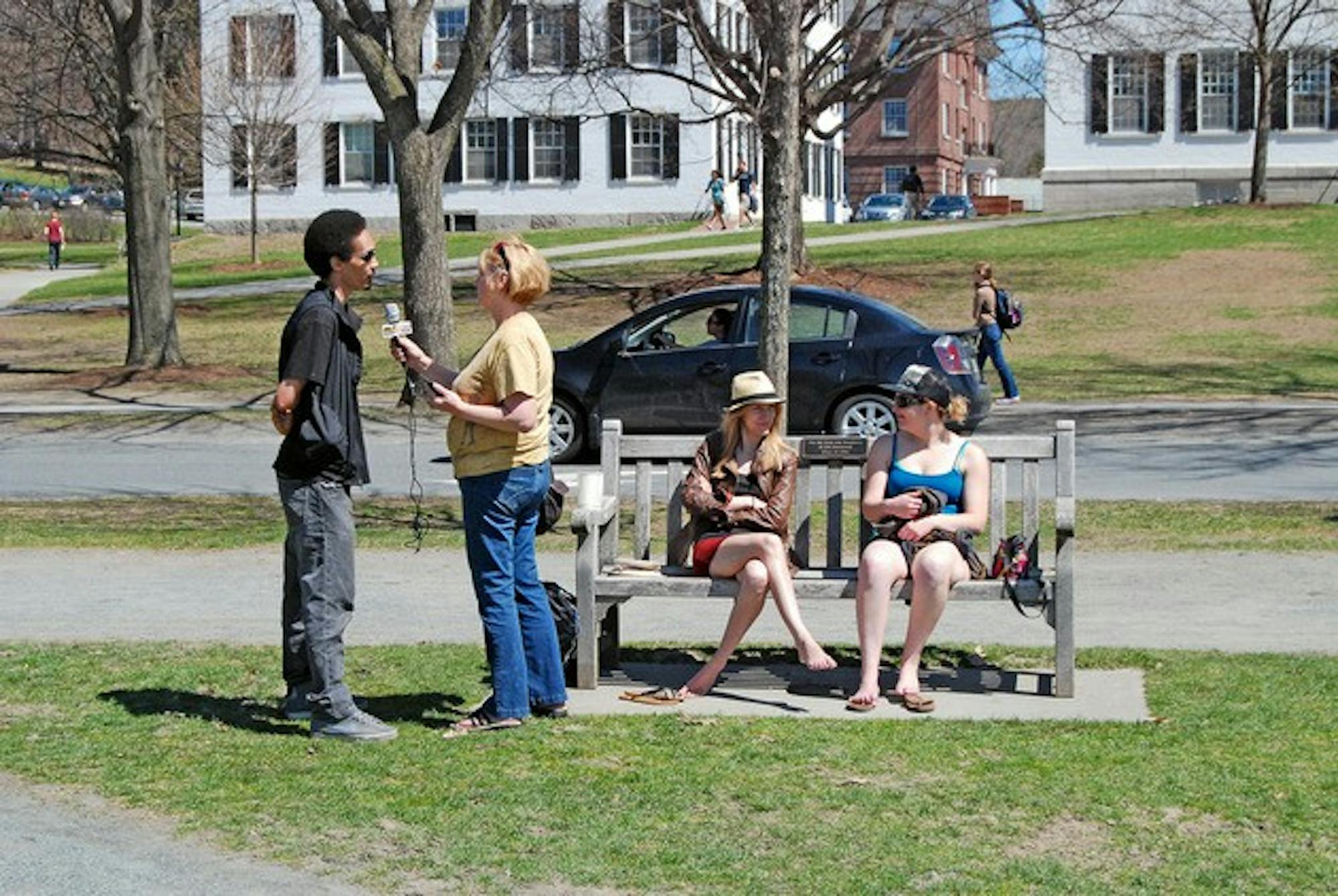Coverage of the recent events has focused largely on the threats received by students in the wake of their protest of the Dimensions accepted student show, as well as the class cancellation on Wednesday.
A recent Bloomberg piece titled "Dartmouth pushes unity to heal as protests mar applicant visits" reported that the College's decision to cancel classes showed an attempt to "repair its image." The article outlined a "history of turmoil" over campus culture, including hazing, binge drinking and racism.
A USA Today story on April 27 conveyed an atmosphere of racism, referring to the racist graffiti that was found on a dormitory whiteboard in January. Students interviewed for the USA Today article spoke positively about the programming that replaced classes on April 24.
A recent Salon article, titled "Dartmouth College suspends classes after campus activists receive rape threats" primarily reported on the threats the students received online and not on their actual protest.
Many articles expressed solidarity with the protestors, arguing that their demonstration was necessary and the resultant threats inexcusable.
The feminist blog Jezebel wrote that "there's no better way to get a prestigious private college's attention than to threaten its reputation." The author lauded the protesters for drawing attention to sexual assault on campus and criticized those who called the protest "rude" or "unproductive."
The Valley News' editorial board also took a harsh stance on students who reacted negatively to the protesters' efforts.
"Welcome to Dartmouth, kids, where minority students and non-conformists are present only at the sufferance of those entitled to be there, and where speaking your mind might just have negative implications for your physical well-being," they wrote last Thursday.
The editorial board wrote that Dartmouth students' emphasis on the protesters' venue choice was irrelevant, and that the protesters did a service to prospective students and current students by demanding action.
An article by ThinkProgress, a blog run by the think tank Center for American Progress, focused on an email sent from Board of Trustees Chair Steve Mandel '78 to the Dartmouth community, in which Mandel wrote that both the protesters and those who threatened them would be considered for disciplinary action. The article, written by Sy Mukherjee '12, criticized Mandel for "lumping the actions of student protesters with those making threats of physical harm against them as equivalent declines in civility.'"
"Some administrators and students are upset with the protest because it occurred during a prospective students' event that has traditional significance for the College," Mukherjee wrote. "But the protesters likely felt compelled to take that extraordinary action given the Dartmouth administration's historical incompetence in dealing with issues of sexual assault, homophobia, and racism on campus."
In an article for PolicyMic, titled "Dartmouth College Protest: Protesting Rape Gets Same Punishment As Rape and Death Threats," Shwetika Baijal lambasted Mandel's email, portraying the administration as divided between punishing the protestors and leading campus to confront the issues raised. Baijal concluded that the College chose to pursue the former.
Travis Mushett '08, the editor of New York-based online magazine Blunderbuss, wrote an essay titled, "Get Rude: In Praise of Obnoxious and Annoying Activism." The article condemned students' negative reaction toward the protest, arguing that the protesters needed to make a public scene in order to draw attention to their cause.
The article has garnered unprecedented attention for Blunderbuss, and it quickly became the website's most well-read piece, Mushett said. Many young alumni emailed him in support of his message.
Since the administration has failed to react to more passive pleas for change, national media focus may benefit the College in the long run, leading to a changed campus climate, Mushett said.
"There is a lot of sexism and homophobia ingrained at the College, and I think that the national coverage is not sensationalized," Mushett said. "I don't mind the portrayals in the media if it helps things."
The Atlantic Wire criticized the College's response to the protest and ensuing threats, and took issue with Interim President Carol Folt's speech at the Wednesday morning community gathering, when Folt compared campus climate to a "pressure cooker very close to exploding." The analogy comes on the heels of the Boston bombings that used pressure cookers as explosives.
Jonathan Lu '16 called the national coverage of recent events unfair.
"They are imposing a familiar outline of a narrative in which social justice protesters stand up to an elite institution that won't admit to its own flaws," Lu said.
Lu said he believes that since the Rolling Stone article exposing Dartmouth fraternity rush rituals last year, the College has gained a place in the national media's radar as an "Ivy League tragedy."




